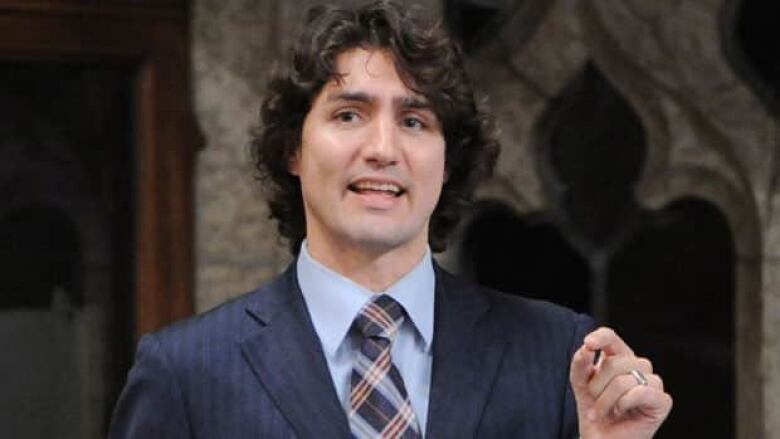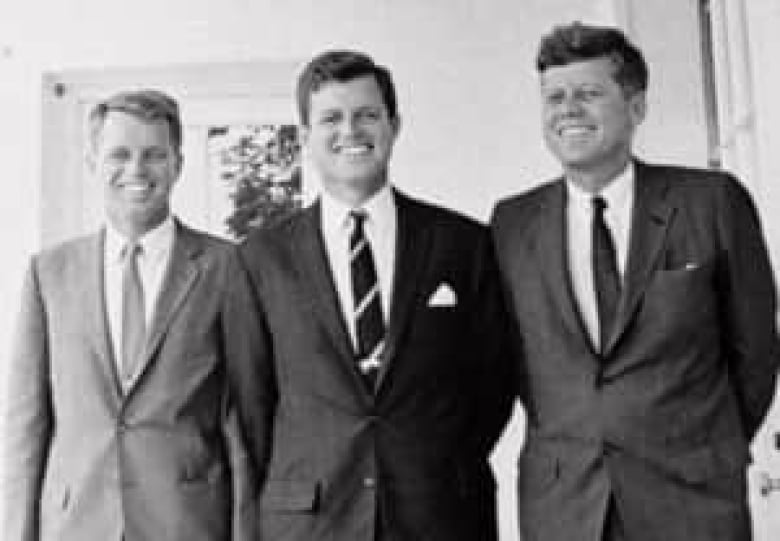How will Justin Trudeau contend with his father's legacy?
Political dynasties a blessing and a curse

Justin Trudeau had not yet thrown his hat into the Liberal leadership race on Wednesday, but the mere mention that the Quebec MP is expected to take the leap dealt a jolt of excitement through the beleaguered party – and the media – and sent his name trending in the Canadian Twitterverse.
But it isn’t so much the popular politician’s record as the MP in the Montreal riding of Papineau for the past five years that has people enthralled.
There's that legacy the 41-year-old carries – bequeathed by his late father, the larger-than-life former prime minister Pierre Trudeau. He also has political blood from his mother’s side. His grandfather, James Sinclair, was a Liberal MP for 18 years and a cabinet minister for five of them.
Will the inevitable comparisons and associations to his predecessors help, or hurt, the younger Trudeau? Are political dynasties an asset or a liability in today’s political climate?
"It can work both ways," says François-Pierre Gingras, retired professor of political science at the University of Ottawa. "In that sense, the initial notoriety is definitely a plus but you have to prove yourself in order to overcome the negative aspects of it. So you might have to work harder."
A brand name
The recognition that comes with a powerful family brand name – be it Trudeau, or Kennedy or Romney south of the border – can be an asset when rising through the political ranks. But the successes, and failures, associated with that brand also have the power to set an impossible standard to reach, or attach negative connotations that are difficult to shake off, Gingras says.
While there are no political dynasties in Canada the likes of Bushes or even the Clintons, some prominent Canadian politicians have followed in their father’s footsteps.
Former prime minister Paul Martin’s father, Paul Martin Sr., served in cabinet under four different Liberal prime ministers in his 39 years of public service, beginning in 1935. The elder Martin ran for the Liberal leadership, in 1948, 1958 and 1968 and lost – the last time to the elder Trudeau.
Preston Manning, the former opposition leader and the founder of the Reform Party, grew up in a political family. His father, Ernest Manning, was the Social Credit Party premier of Alberta from 1943 to 1968.
Both benefited from instant name recognition, says André Turcotte, a professor at Carleton University and co-author of the book Dynasties and Interludes: Past and Present in Canadian Electoral Politics.
"While Paul Martin was a very successful businessman prior to joining the Liberal Party, right off the bat because of his name and family lineage he was automatically not just an important MP, he was automatically a leadership candidate," Turcotte notes. "And the same thing with Preston, because of his dad, and legacy, Preston was able to start a party and automatically draw on a very broad base of support."
Former PM's legacy still fresh
However, both Manning and Martin emerged on the political landscape decades after their father’s reign. In Trudeau’s case, the accomplishments and the failures of his father are still fresh in Canadian’s minds, Turcotte says.

"The polarizing effect of his legacy will be more of an immediate impact. People will be more likely to remember the good things and the bad things about his father," he said.
Trudeau senior’s National Energy Program and the Constitution in 1982 likely continue to leave a bad taste for many voters in Alberta and Quebec, says André Lecours, a political scientist at the University of Ottawa. The Quebec MP may be able to get the Liberals out of third place in the House of Commons, but it will be tough to reach parts of the country where the Liberals need more votes, he adds.
"They have strong feelings about his father, therefore it is probably that the feeling they have towards his father will permeate the way they see this son. His job will be to increase the electorability of the Liberal Party of Canada, so this will be difficult. You have a whole section of Westerners and francophone Quebecers who dislike Pierre Trudeau. So they will probably dislike the son, I think."
Still, Trudeaumania prevails. According to a just-released Angus Reid poll, 36 per cent of those surveyed, the largest proportion, regard Trudeau as the best Canadian prime minister since 1968. That, too, is hard to live up to.
It’s difficult to draw parallels with other political family trees in Canada, Turcotte says, since few Canadian figures elicited as much adoration and hatred, simultaneously, as Trudeau.
U.S. political lineage a longstanding tradition
And there are fewer political dynasties in Canada, which tends to have less of a cult of personality in politics, unlike in some other countries, such as the U.S.
In the United States, political lineage has been a key component from the beginning, says Barbara Perry, a senior fellow at the University of Virginia’s Miller Center, a nonpartisan institute that seeks to expand understanding of the presidency and political history.
It starts with the second president of the U.S., John Adams, and his son, John Quincy Adams, the country’s sixth president. Then there's the Roosevelt family, with Theodore Roosevelt taking the top job in 1901, and Franklin D. Roosevelt following in his footsteps in 1933.
But the best known political family is the Kennedy clan, sometimes referred to as American royalty, who spawned several prominent politicians, including president John F. Kennedy, and his brothers Robert and Edward (Ted), both presidential primary candidates. All three were also U.S. senators, and Robert was John's attorney general.
At least four members of the next Kennedy generation have gone into politics. Two U.S. governors, Arnold Schwarzenegger in California and Andrew Cuomo in New York, married into the family.
It’s a legacy that still continues to pay dividends for the next generation, with Joseph Kennedy III, Robert's grandson, now running for Congress in a Massachusetts district.
A hard act to follow
For Ted Kennedy, the weight of his predecessors was too much to bear, says Perry.

One brother died as a Second World War hero, while two were assassinated and widely revered. "So, imagine having to live up to the image of your departed heroic threesome of brothers ahead of you," she suggests.
"First of all the sadness and the grief, on top of which he had to assume the role of the family patriarch … when all of them were gone, he had to take on the political role, he had to take the patriarchal role of a huge dynasty."
Although he didn’t set out with presidential ambitions, it fell to him to assume the leadership. But when his car plunged off a bridge at Chappaquiddick after a night of revelry in 1969, leading to the drowning death of passenger Mary Jo Kopechne, those prospects came to a halt.
"In many ways, he embodies the blessings and the curses of being in a dynasty," Perry tells CBC News.
It's also possible for politicians to distance themselves from a tarnished legacy.
Most presidents become more popular after they leave office, she says. She predicts that George W. Bush, who finished his term as an unpopular president and was absent from the recent Republican National Convention, will likely redeem his reputation in the long run.
There is even speculation about Jeb Bush, George W. Bush’s brother and former Florida governor, vying to be the Republican presidential nominee in either 2016 or 2020. It also appears that his son, George P. Bush, is being groomed to enter politics as well.
Social media spotlight

But in today’s hyper-connected world, with every word uttered by prominent politicians disseminated and dissected on blogs and social media, there's a brighter spotlight on this batch of politicians, says Perry.
Controversial "47 per cent" remarks by Republican presidential nominee Mitt Romney – whose father was Michigan governor and a contender in the 1968 Republican presidential primary – caught on hidden camera and uploaded to YouTube, are the latest example.
In the Liberal leadership race, Trudeau will be put to the same, if not more meticulous, scrutiny as other candidates. The name will serve him better in this round, rather than in an election race, Turcotte expects.
Trudeau will have to prove his abilities.
"Traditionally, successful politicians have been those who have learned the ropes, not just capitalized on the name," he says.
With files from CBC News

